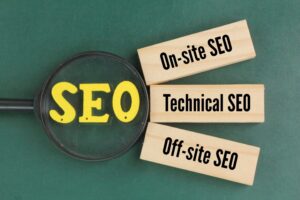Search Engine Optimization (SEO) is a fundamental aspect of digital marketing that focuses on improving the visibility and ranking of websites in search engine results pages (SERPs). As the internet continues to grow, the importance of SEO has become increasingly significant for businesses and individuals who want to attract organic traffic to their websites. In this article, we will explore the different aspects of SEO, how it works, and why it is essential for online success.
How SEO Works
SEO is a complex process that involves several strategies and techniques to improve a website’s visibility on search engines like Google, Bing, and Yahoo. The primary goal of search engine optimization is to increase the quality and quantity of organic (non-paid) traffic to a website by ensuring that it appears high in the search results for relevant queries.
Search Engine Crawlers
Search engines use automated software known as crawlers or spiders to scan and index the vast content available on the internet. These crawlers visit websites, following links from page to page, and gather information about the content, structure, and other technical aspects of each site. This data is then stored in the search engine’s index, which is a massive database of all the content available online.
Indexing and Ranking
Once the crawlers have indexed the content, search engines use complex algorithms to analyze and rank websites based on various factors. These algorithms consider hundreds of ranking signals, including keywords, site structure, backlinks, user experience, and more. The goal is to present the most relevant and high-quality content to users in response to their search queries.
The Importance of SEO
SEO is crucial for several reasons. First and foremost, it helps businesses and individuals reach their target audience by making their websites more visible on search engines. The higher a website ranks in the SERPs, the more likely it is to attract clicks and visits. This increased visibility can lead to more traffic, higher engagement, and ultimately, more conversions and revenue.
Organic Traffic
Organic traffic refers to visitors who find a website through unpaid search results. Unlike paid advertising, which requires a financial investment, organic traffic is essentially free, making it one of the most cost-effective ways to generate leads and sales online. SEO plays a vital role in driving organic traffic by improving a website’s ranking and making it easier for users to find.
Credibility and Trust
Websites that appear at the top of the search results are often perceived as more credible and trustworthy by users. This perception can significantly impact a business’s reputation and customer trust. By investing in SEO, businesses can establish themselves as authorities in their industry and build long-term relationships with their audience.
On-Page SEO
On-page SEO refers to the optimization of individual web pages to improve their ranking and visibility on search engines. This involves optimizing the content, HTML code, and other elements of a page to make it more search engine-friendly.
Content Optimization
Content is the backbone of any successful SEO strategy. High-quality, relevant, and engaging content is essential for attracting and retaining visitors. Content optimization involves using the right keywords, creating informative and valuable content, and ensuring that it meets the needs and expectations of the target audience.
Meta Tags and HTML Elements
Meta tags, including the title tag and meta description, are HTML elements that provide search engines with information about a web page’s content. These tags play a crucial role in determining how a page is displayed in the search results. Properly optimized meta tags can improve click-through rates (CTR) and enhance a page’s overall SEO performance.
Off-Page SEO
Off-page SEO refers to actions taken outside of a website to improve its ranking on search engines. This primarily involves building high-quality backlinks from other reputable websites, which signal to search engines that the content is valuable and trustworthy.
Link Building
Link building is one of the most critical aspects of off-page SEO. By acquiring backlinks from authoritative websites, a website can boost its domain authority and improve its chances of ranking higher in the search results. However, it’s essential to focus on quality over quantity when building links, as low-quality or spammy links can harm a website’s SEO.
Social Signals
Social media activity, such as likes, shares, and comments, can also impact a website’s SEO performance. While social signals are not direct ranking factors, they can increase a website’s visibility and drive more traffic, which can indirectly improve its ranking on search engines.
Technical SEO
Technical SEO involves optimizing a website’s technical aspects to ensure that search engines can crawl, index, and rank it effectively. This includes optimizing the site’s speed, mobile-friendliness, security, and more.
Website Speed and Performance
A fast-loading website provides a better user experience and is more likely to rank higher in the search results. Search engines, particularly Google, prioritize websites that load quickly and offer a seamless browsing experience. Therefore, optimizing website speed and performance is a crucial aspect of technical SEO.
Mobile-Friendliness
With the increasing use of mobile devices, search engines have placed more emphasis on mobile-friendliness as a ranking factor. A mobile-friendly website is one that is responsive, meaning it adapts to different screen sizes and provides an optimal user experience on all devices. Ensuring that a website is mobile-friendly is essential for SEO success.
Secure Sockets Layer (SSL)
SSL is a security protocol that encrypts data transmitted between a user’s browser and a website. Websites with SSL certificates have “https” in their URLs and are considered more secure by search engines. Having an SSL certificate is not only important for protecting user data but also for improving a website’s SEO, as search engines prioritize secure websites in their rankings.
Local SEO
Local SEO is a specialized form of SEO that focuses on optimizing a website for local search results. This is particularly important for businesses that operate in specific geographic areas and want to attract customers from their local community.
Google My Business
Google My Business (GMB) is a free tool that allows businesses to create and manage their online presence on Google, including their business listing, reviews, and location on Google Maps. Optimizing a GMB listing is essential for local SEO, as it helps businesses appear in local search results and attract nearby customers.
Local Citations
Local citations are online mentions of a business’s name, address, and phone number (NAP) on other websites, directories, and social media platforms. Consistent and accurate local citations are crucial for local SEO, as they help search engines verify a business’s location and improve its visibility in local search results.
Measuring and Tracking SEO Success
Measuring and tracking the success of an SEO strategy is essential for understanding its effectiveness and making data-driven decisions for future improvements. Several tools and metrics can be used to monitor SEO performance.
Google Analytics
Google Analytics is a powerful tool that provides insights into a website’s traffic, user behavior, and conversion rates. By tracking key metrics such as organic traffic, bounce rate, and average session duration, businesses can assess the impact of their SEO efforts and identify areas for improvement.
Google Search Console
Google Search Console is another valuable tool that helps website owners monitor their site’s presence in Google search results. It provides information on search queries, click-through rates, and indexing status, allowing businesses to optimize their content and improve their rankings.
The Future of SEO
SEO is an ever-evolving field, and staying up-to-date with the latest trends and best practices is essential for maintaining a competitive edge. As search engines continue to refine their algorithms and user behavior changes, SEO strategies must adapt to ensure ongoing success.
Voice Search and AI
Voice search and artificial intelligence (AI) are two emerging trends that are shaping the future of SEO. With the increasing use of voice-activated devices like smart speakers, optimizing content for voice search is becoming more important. AI, on the other hand, is being used by search engines to better understand user intent and deliver more relevant search results.
User Experience (UX)
User experience is becoming a more significant factor in SEO. Search engines are placing more emphasis on how users interact with a website, including factors like page load speed, mobile-friendliness, and ease of navigation. Providing a positive user experience is crucial for improving SEO and achieving higher rankings.
SEO AI
As artificial intelligence (AI) continues to advance, its influence on SEO is becoming increasingly significant. SEO AI refers to the integration of AI technologies into SEO strategies to enhance search engine performance, optimize content, and better understand user intent. This section will explore how AI is transforming SEO and the tools that leverage AI to improve search engine rankings.
AI-Driven Algorithms
Search engines like Google have incorporated AI into their algorithms to deliver more accurate and relevant search results. Google’s AI algorithm, BERT (Bidirectional Encoder Representations from Transformers), is designed to better understand the context of words in a search query, leading to more precise and contextually relevant search results. AI-driven algorithms are constantly evolving, which means that SEO strategies must adapt to these changes to maintain or improve rankings.
Final Thoughts On SEO
SEO is a critical component of any successful digital marketing strategy. By understanding how search engines work, the importance of SEO, and the various strategies involved, businesses can improve their online visibility, attract more organic traffic, and achieve long-term success. As the digital landscape continues to evolve, staying informed and adapting to new trends will be key to maintaining a competitive advantage in the world of SEO.



